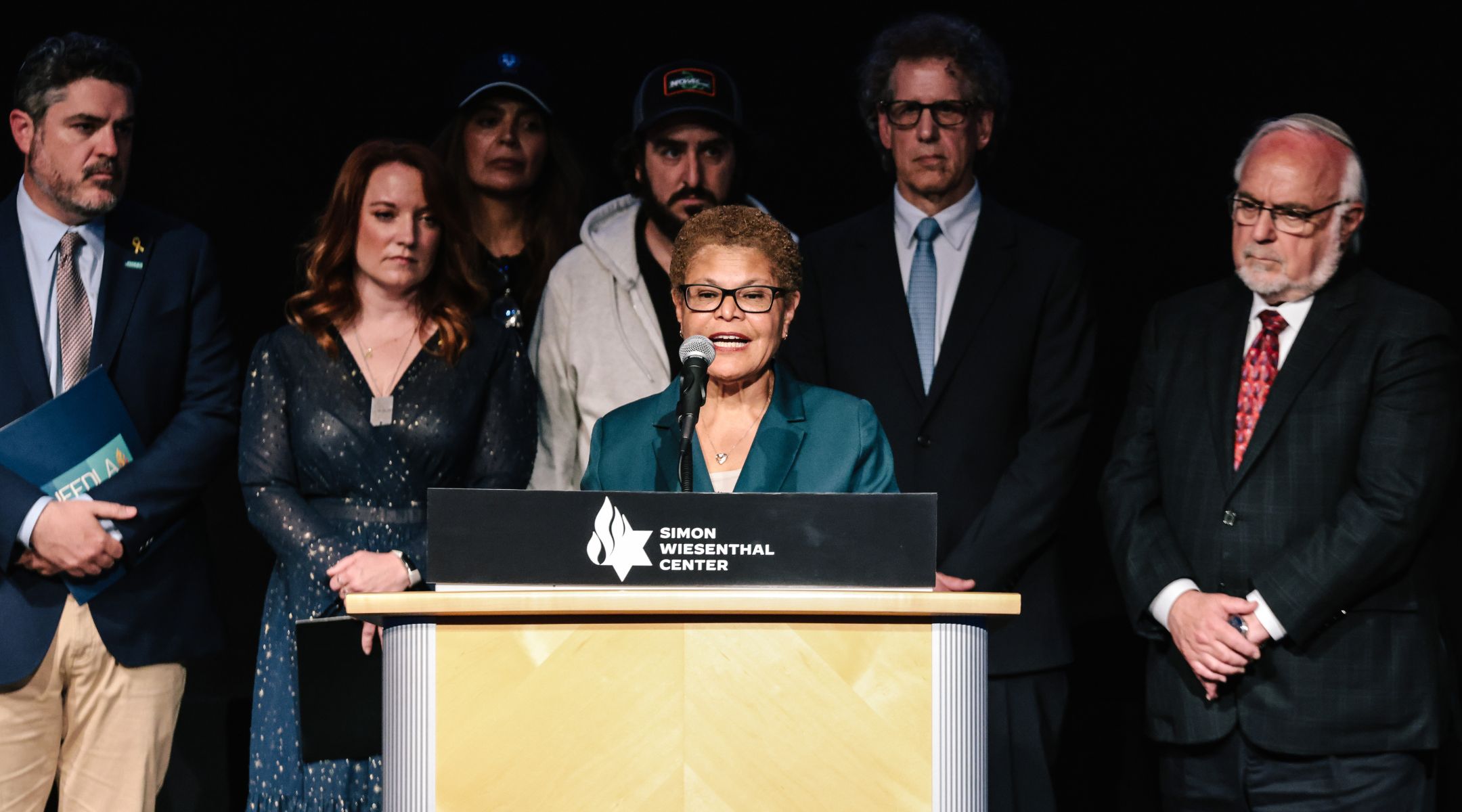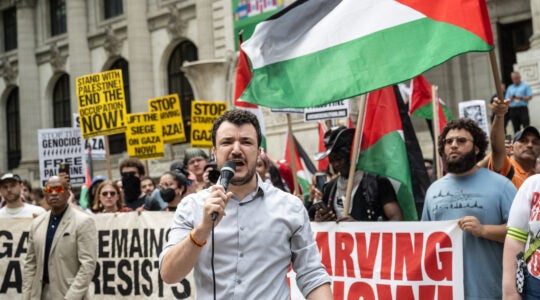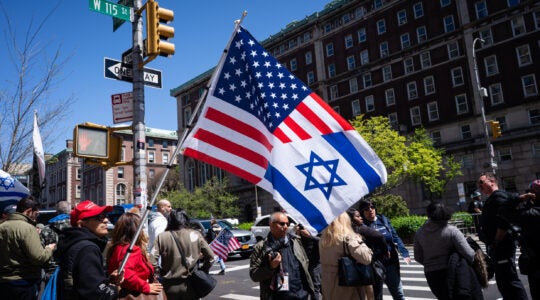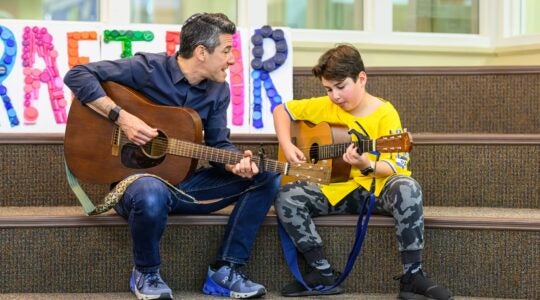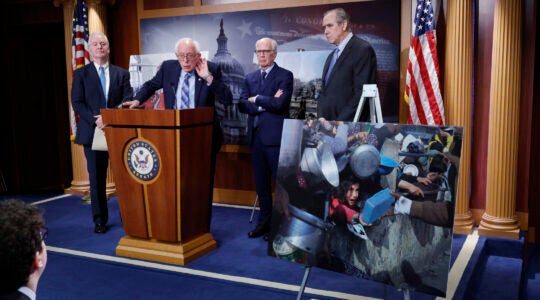LOS ANGELES — Facing criticism over the police response to violence outside a Los Angeles synagogue, an LAPD official said the department erred in how it handled the protest and made estimates that “were not correct.”
And L.A. Mayor Karen Bass said she has taken steps to explore banning masks at protests, though she said she was skeptical that such a measure would hold up in court.
Bass and the police commander were speaking at a virtual security briefing convened on Wednesday afternoon by the Jewish Federation of Los Angeles, days after pro-Palestinian and pro-Israel protesters violently skirmished outside an Orthodox synagogue in the heavily Jewish neighborhood of Pico-Robertson. Video of the clashes circulated widely, sparking accusations of a “pogrom,” and one person was arrested.
In the wake of the pro-Palestinian protest, which gathered to oppose an Israeli real estate fair held at the synagogue, figures ranging from President Joe Biden to local city officials condemned antisemitism. And at Wednesday’s event, LAPD commander Steve Lurie, the department’s Jewish community liaison, said the LAPD was unprepared for the size and nature of the rally.
“We did know that Sunday’s event was planned. We did know that people were coming to target that synagogue,” Lurie said. “Our estimates of how many, and the level of vitriol that we predicted, were not correct.”
In the wake of the clashes, some local Jews have faulted the LAPD for not responding more promptly or forcefully. Sia Koredestani, who works for an organization boosting Europe-Israel ties, posted on X, “There should have been three to four times as many police ready to respond to the anti-Jewish violence in the Pico-Robertson neighborhood.” Sam Yebri, a former candidate for local office, wrote, “Our elected officials are not keeping Jewish Angelenos safe.”
One presenter at the real estate event, who did not give his name to avoid being targeted and doxxed, told the Jewish Telegraphic Agency that “our beef was with LAPD,” not the pro-Palestinian protesters, and called the police “flat-footed.”
Lurie said the LAPD had deployed more than a dozen officers in anticipation of the protest, and that the department called for backup once those initial officers were overwhelmed. He said that ultimately, between 60 and 75 officers were present less than an hour after the protest’s outbreak.
“That is frustrating, and it is a long time, but does represent a fairly rapid response when we have to grab police officers from all over the city,” Lurie said.
Speaking at the briefing, Bass called the violence “abhorrent” and said she was convening religious leaders to discuss “how to protect sacred spaces, sharing ideas, practices and strategies to keep congregants safe.” The LAPD will work with Jewish security agencies, she added, to take “proactive action to prevent these incidences from taking place to begin with.”
She added that she would discuss a mask ban with the city’s attorney — a proposal also being floated in New York in the face of disruptive pro-Palestinian rallies there — though she was skeptical of its legality. Mask bans, which were on the books for decades in some states, have been challenged on First Amendment grounds. Some critics have said bans would stigmatize those who wear masks as a public health measure. Bass first raised the idea at a press conference on Monday.
“At this point, we don’t think that this will withstand judicial scrutiny, but we are still looking into it, and we’re examining the idea of having buffer zones around houses of worship,” Bass said.
Rabbi Noah Farkas, the federation’s CEO, called the protest a “coordinated assault” on the Jewish community. He added that the violence was not surprising.
“This is a moment that we have been almost slouching towards for a couple years now,” he said. “As we’ve said before many times, hate speech, hate incidences, they lead to hate crimes.”
This is not the first time clashes have broken out in Los Angeles between pro-Israel and pro-Palestinian protesters. At the University of California, Los Angeles, last month, pro-Israel protesters attacked the perimeter of a student pro-Palestinian encampment — prompting disavowals by local Jews who said they rejected violence. One pro-Israel protester, an Israel-American teenager, has been arrested in connection with the incident.
Following Sunday’s protest, most statements by officials have condemned antisemitic intimidation and violence. But the presenter at the Israeli event at the synagogue said he was also “embarrassed” by the conduct of the pro-Israel activists at the scene
“You can protest, you can chant, you can say whatever you want,” he said. “But the vitriol on the pro-Israel side was disconcerting. I don’t think that they are representative of the broader community.”
Also on the call Tuesday were L.A. Councilwoman Katy Yaroslavsky, U.S. Rep. Brad Sherman and California State Assemblymember Jesse Gabriel, who chairs the state’s legislative Jewish caucus.
Gabriel, who said he was about to vote on the state budget from the capitol in Sacramento, said the budget agreement includes a $160 million commitment for a program to secure nonprofits including houses of worship. Yaroslavsky said she is also pushing the city to grant $1 million to Jewish groups to enhance security.
“This is incredible funding that has gone to dozens of shuls and synagogues and Jewish day schools and Jewish community centers across the state,” Gabriel said of the state budget funds. “This is a major, major commitment from the state of California to step up and protect our community.”
JTA has documented Jewish history in real-time for over a century. Keep our journalism strong by joining us in supporting independent, award-winning reporting.
